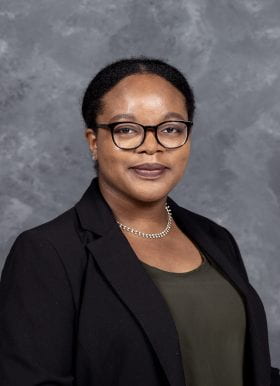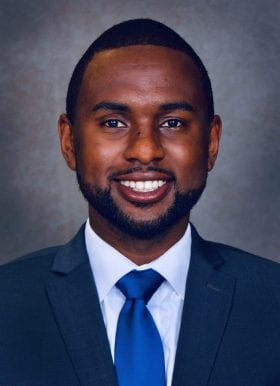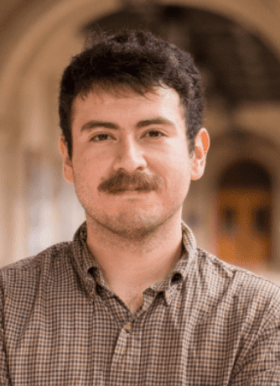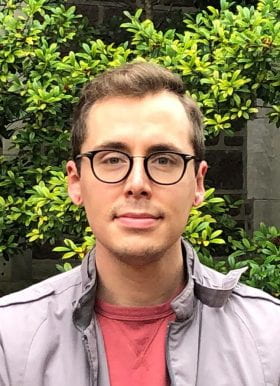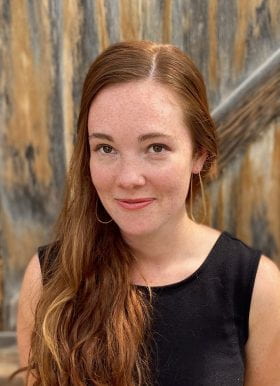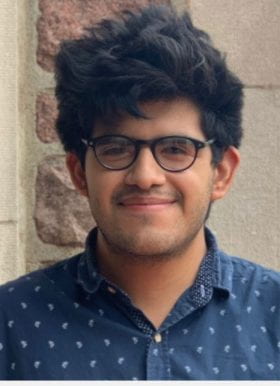
The application cycle for this funding opportunity has now closed.
The Center for the Study of Race, Ethnicity & Equity offers a limited number of Small Grants of up to $1,000 to support activities related to the advancement of the CRE2 mission, three CRE2 pillars, and the 2020-2023 CRE2 Programmatic Themes.
These grants are reviewed on a rolling basis and will be awarded until the funds are exhausted. The Small Grants program seeks to be responsive to the typical resource needs scholars face while undertaking research, exhibitions, and other creative works on the subjects of race and/or ethnicity. Examples include books, subventions, editing costs, research assistance, and travel for research or conferences. Small Grants are intended to help address immediate needs of the research community that may arise outside of larger grant opportunities for funding. Larger grant requests will remain the purview of other grant programs.
Only CRE2 Faculty Affiliates, Graduate Student Affiliates, Postdoctoral Affiliates, and Resident and Trainee Affiliates are eligible to apply for grants under this program. Eligibility is limited to one Small Grant per year as principal investigator.
Proposals should be no longer than 400 words, including the identification of the basis of the scholarly activity (e.g., poster presentation of research on race/ethnicity), description of the resources needed (e.g., airfare, statistical software license), the event or where the resource will be needed (e.g., annual APPAM meeting in Denver), timing of the resource need (e.g., to secure professional editor during spring term), and the anticipated outcomes should the grant be provided (e.g., the dissemination of research, completion of final monograph draft). All Small Grant proposals that are approved for funding and involve the use of human subjects (e.g., payment or stipends to research participants) must obtain appropriate human subjects approval through the University’s Institutional Review Board before CRE2 funds are disbursed.
COVID-19 Contingencies: If the proposal includes travel plans, we encourage applicants to include one additional paragraph with an alternative research plan that does not include travel.
We’ve reached our capacity for this funding opportunity. The application cycle will open again in Fall 2024.
Budget items may include support for data entry, interviews, data acquisition, access to restricted-use data, travel costs related to data collection or meetings with collaborators, creative materials, and other reasonable costs. The Center will not pay for computer equipment when that computing can reasonably be accomplished with the existing equipment on campus. Note that travel-related grants may require the submission of a travel report and reimbursement of the grantee’s airfare purchase after the conference is attended. Unspent funding at the end of the grant period will revert to the CRE2 Small Grant pool unless a request for a time extension is submitted and CRE2 leadership approves the request. Budget Rationales should include outside resources (if any) that will be used to achieve the aims of the project.
The CRE2 Leadership Team will screen all submitted proposals to determine whether they align with the program’s goals and will review qualifying proposals.
The Center will monitor progress on Small Grants. Grantees will provide an expense report upon request. Grantees will submit a final progress report and any products of the grant within one (1) month after the end date of their grant period and will notify CRE2 of any proposals and scholarly works subsequently submitted or awarded/accepted. Potential grant products and scholarly works include publications; grant proposals; recordings; installations or exhibits; documentation of conferences, symposia, or residencies; and scholarly awards or honors. All products generated with the support of a CRE2 Small Grant will acknowledge the program using the statement, “This work has been funded by the Center for the Study of Race, Ethnicity & Equity at Washington University in St. Louis Small Grant program, but the views remain those of the authors.”
Measuring defensiveness about anti-black intergroup bias

Jennifer Beatty
Doctoral Student, Psychological and Brain Sciences
- Email: jenn.beatty@nospam.wustl.edu
bias
bias reduction
bias regulation
defensiveness
discrimination
emotion regulation
prejudice
racism
stereotyping
stigma
quantitative methods
This research project aims to advance bias reduction efforts by examining feedback defensiveness across racial and ethnic groups. Building on the development of a valid self-report measure of feedback defensiveness, the study seeks to identify predictors of individual differences in feedback defensiveness and assess its implications for intergroup relations. Study 1 evaluates feedback defensiveness among non-Black racial/ethnic groups, investigating its relationship with identity, personality, and intergroup measures. In Study 2, participants receive feedback about biases from same- versus different-group racial/ethnic members to assess defensiveness levels. The project aims to elucidate factors influencing receptiveness to bias feedback, contributing crucial insights to bias reduction efforts.
Aestheticizing Politics/Politicizing Aesthetics: The St. Louis Symposium on Radicalism in U.S. Arts

Marc Blanc
Graduate Student, English and American Literature
- Email: m.blanc@nospam.wustl.edu
African American literature
Midwestern regionalism
Print culture studies/history of the book
Radical and left-wing movements
The “Aestheticizing Politics/Politicizing Aesthetics: The St. Louis Symposium on Radicalism in U.S. Arts” convenes scholars, artists, and community activists to explore the intersection of political action and artistic practice. Organized to foster networking and secure publication opportunities, the symposium will feature panels at the Schlafly branch of the St. Louis Public Library, examining the role of art, literature, and music in radical movements from both left and right perspectives. Additionally, the event will showcase the work of local writers, publishers, and artists through visual art displays and panel readings. The symposium culminates with keynote addresses, including one by Prince Shakur, a renowned queer Black memoirist. The event is scheduled for August 23-24, 2024.
Mothers with Sons: A RETROSPECTIVE UNDERSTANDING OF HOW BLACK MEN PERCEIVED THEIR MOTHERS COMMUNICATION DURING THEIR TEENAGE YEARS
This project aims to acquire data for the purpose of contributing to the existing body of literature regarding communication patterns between Black/African American mothers and their adolescent sons. The overarching goal is to shape discourse and contribute to scholarly knowledge while fostering community engagement and informing practices that benefit Black families and adolescents.
The Lived expereince of water infrastructure in cahokia heights, il

Carlye Chaney
NSF SBE Postdoctoral Fellow, Biology
Developmental Origins of Health and Disease
Environmental exposures
Health disparities
The research aims to investigate infrastructural violence and water insecurity in Cahokia Heights, IL, a majority-Black community experiencing recurring flooding due to poor water infrastructure. Utilizing a photo voice study, participants engage in photography and discussions to explore their experiences and perceptions of these issues. The project facilitates community awareness through a presentation of the photos and aimed to provide nuanced insights through focus group discussions. Additionally, the study intends to produce a peer-reviewed article to contribute to the scientific understanding of the challenges faced by marginalized communities.
Melvin Dixon’s Diasporic Search for Sensuality in Translations of Léopold Sédar Senghor and Jacques Roumain

Nathan H Dize
Assistant Professor of French
- Email: dize@nospam.wustl.edu
Afro-Diasporic Religious Cultures
Black Feminisms
Black French and Francophone Studies
Caribbean Studies
Digital Humanities
Mental Health and Care Work
Translation
This project aims to explore Melvin Dixon’s life as a queer Black translator of Francophone African and Caribbean writers. It is also set to fit within a broader manuscript titled, “Follow the Translator: Legacies of Black Translators of Francophone African and Caribbean Literature.”
Josephine Baker Study Day at Petit Palais

Joanna Das
Assistant Professor of Dance, Performing Arts Department
African Diaspora
Critical Race Theory
Dance
Popular Performance
Racial Capitalism
US History
Whiteness
Professor Das was invited by the Curator of Modern and Contemporary Art at the Petit Palais Museum of Fine Arts in Paris to participate in a “Josephine Baker Study Day” on March 15, 2024. The symposium was part of the museum’s special exhibition “Modern Paris: 1905-1925,” with Josephine Baker being the focal point. Her expertise on Baker’s roots in St. Louis and her experiences with racialization in America will provide crucial insights for participants.
Black Energy: The Infrastructures of the BLACK ARTS MOVEMENT

Chris Dingwall
Assistant Professor of Design History, Sam Fox School of Design & Visual Arts
- Email: dingwall@nospam.wustl.edu
African America
Design
Material Culture
Racial Capitalism
Slavery & Emancipation
This project seeks to investigate the archival materials generated by radical Black artists, writers, editors, and designers during the 1960s and 1970s. By focusing on graphic design within the Black Arts Movement (BAM), the project aims to highlight how cultural energy was transmitted across urban centers and the African diaspora. Initial research will commence in the summer at three archival sites: the Robert W. Woodruff Library in Atlanta, the Walter Reuther Library at Wayne State University in Detroit, and the Joseph Labadie Collection at the University of Michigan Library in Ann Arbor.
Extravagent Camp: The Queer abjection of asian america

Chris A Eng
Assistant Professor of English
- Email: ceng@nospam.wustl.edu
Asian American Studies, Citizenship and National Belonging, Critical Ethnic Studies, Cultural Studies, Diaspora and Empire, Gender and Sexuality, Literature and Performance
The monograph “Extravagant Camp: The Queer Abjection of Asian America,” slated for publication in February 2025 with NYU Press, explores the multifaceted meanings of “camp” as both a geopolitical space and a mode of queer expressiveness within the Asian American context. Authored by Chris A. Eng, the book delves into how camp performances reimagine historical narratives of Asian American experiences, including instances such as Chinese railroad labor, Japanese American incarceration, and Vietnam War refugee resettlement.
Segreagation by design (sbd)- mlk corridor app

Catalina Freixas
Associate Professor, College of Architecture, Sam Fox School of Design & Visual Arts
- Email: freixas@nospam.wustl.edu
Demographics
Housing
Neighborhood
Policy
Racial Inequalities
Resilience
Social Architecture
The Segregation By Design seminar, a cross-university, transdisciplinary course, focuses on exploring the role of planning and design in contributing to segregation in St. Louis through historical analysis. Partnering with SLACO (St. Louis Association of Community Organizations), students engage with 13 community members to work on a project involving the MLK corridor. The project aims to revolutionize data collection by creating a methodology for digital recording of systematic observations, enhancing accessibility for the wider community compared to traditional mapping methods.
Macro-Level Factors Influencing the Physical Activity Behavior of Urban Settlements in Latin America and Caribbean Small Island Developing States & Spatial Inequity & Inequality Measurement in Health and Place Research
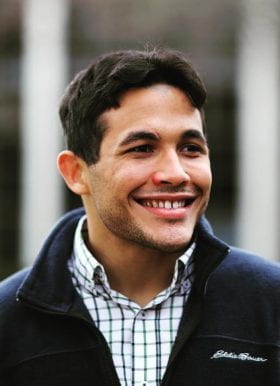
Raul Gierbolini
PhD Student, Public Health Sciences, Brown School
- Email: g.raul@nospam.wustl.edu
Dissemination & Implementation Science
Health Equity
Latin America
Physical Activity

Eugen Resendiz Bontrud
Doctoral Student in Public Health Sciences, Brown School
- Email: eugen@nospam.wustl.edu
Built Environment
The grant facilitated the presentation of two research projects at the Brazilian Congress of Physical Activity and Health. One project, “Macro-Level Factors Influencing the Physical Activity Behavior of Urban Settlements in Latin America and Caribbean Small Island Developing States,” was delivered orally. This work investigates how macro-level factors, such as socioeconomic status, access to recreational facilities, urban planning, built environment, and colonialism, influence physical activity patterns in urban settlements in Latin America and Caribbean Small Island Developing States (SIDS), with a focus on health inequities. The scoping review, “Spatial Inequity & Inequality Measurement in Health and Place Research,” presented as a poster, comprehensively assesses and synthesizes existing literature on spatial inequities and inequality measurements within the domain of health and place research. Overall awardees were able to receive valuable feedback on both presentations that helped contribute to the manuscripts of each presentation and connect with top physical activity researchers in Brazil and Latin America.
Where I’m from: a poetry-writing intervention

Patrick Hill
Associate Professor of Psychological and Brain Sciences
discrimination; health; identity development; marginalization; purpose in life; well-being
The project aims to empirically test the effectiveness of the “Where I’m From” poetry exercise in fostering well-being, a sense of community, and a sense of place among participants.
Exploring the Role of Physician-Patient Race Concordance in Disparities in Access to Neurosurgical Services

Miguel Hernandez-Rovira
- Email: h.miguel@nospam.wustl.edu
Physician-Patient Race Concordance
Health Care Access
Healthcare Disparities
Social determinants of health
This project aims to investigate the correlation between geographic disparities in access to neurosurgical care and the diversity within the academic neurosurgical workforce in the United States. Two primary objectives guide this research: quantifying the representation of ethnic and minority academic neurosurgeons across different hospital referral regions, and assessing disparities in access to neurosurgical services in representative regions throughout the country. The team has already made significant progress in studying 115 unique institutions and 1197 neurosurgeons, revealing significant differences in representation ratios across 279 unique zip codes. To further explore these findings, the team plans to analyze rates of surgical intervention stratified by patient race/ethnicity using data from the Healthcare Cost and Utilization Project. This includes acquiring State Inpatient Databases for New York, Florida, and California, states with observed disparities. The project aims to provide valuable insights into disparities in access to neurosurgical care and hopes to publish its findings to contribute to the existing literature on this topic.
Zakkiyyah Najeebah Dumas O’neal and the work of CBIM (concerned black imagemakers) artists

Meghan Kirkwood
Assistant Professor, Sam Fox School/Visual Arts
Natural resources
Landscape photography
South Africa
Professor Kirkwood’s project brought Zakkiyyah Najeebah Dumas O’Neal to WashU for multiple engagements: delivering a public lecture about her artistic practice in March 2024, attending the opening of her exhibition in the Weitman Gallery, and meeting with students. Ms. Dumas O’Neal, a photographer and video artist, explores the interconnectedness of her lived experiences with historical and contemporary movements through various mediums. As co-founder of CBIM (Concerned Black Image Makers), she prioritizes shared experiences of Black artists within the diaspora.
Saudades for slavery: Longing and black queer temporality in the telenovela xica da silva

John Mundell
Postdoctoral Fellow, African and African American Studies
- Email: mundell@nospam.wustl.edu
African Diaspora Theory
Black Feminisms
Black Queer Studies
Brazil and the Luso-Atlantic World
Critical Whiteness
Latin American Studies
Caribbean Studies
Latinx Studies
Popular Culture
Mundell sought funding to present a paper titled “Saudades dubladas: Transnational Humor and the Drag of Racial Nostalgias in White Chicks/As branquelas” at the Brazilian Studies Association conference in San Diego, April 3-6, 2024, forming part of a panel on Luso-Afro-Brazilian Saudade/Longing genealogy. Beyond academic dissemination, this conference offers crucial networking opportunities for scholars of Brazil and supports career advancement.
Family Separation as a Tool of Oppression in the United States
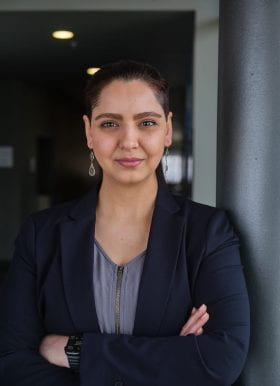
Mitra Naseh
Assistant Professor, Brown School
- Email: naseh@nospam.wustl.edu
Economic and social integration of minoritized and racialized groups
Multidimensional poverty
Migration policy
Trauma and forced migration
Well-being of refugees and immigrants
This grant was used to support a workshop titled “Family Separation as a Tool of Oppression in the United States,” scheduled as part of the “Radical Tradition of Teaching Human Rights” pre-conference sessions for the Council on Social Work Education (CSWE) 2023 Annual Program Meeting (APM) in Atlanta on October 25, 2023. In response to an invitation from the CSWE Center for Diversity and Social and Economic Justice (Diversity Center), a proposal on social justice and migration was submitted and accepted for the pre-conference training theme. Small Grant funding was used to support travel and lodging expenses for the workshop presentation.
Growing State Capacity Locally: The United Nations and State building in Nepal
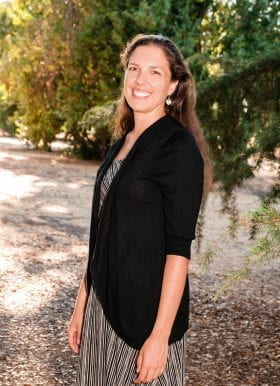
Annamaria Prati
PhD candidate in the Department of Political Science
- Email: aprati@nospam.wustl.edu
International Relations
Mixed Methods
Statebuilding
Traditional Governance
United Nations
The project investigates the potential for international interventions to rebuild post-conflict states, emphasizing historical institutions alongside inclusivity for future governance. Focused on local governments, the study utilizes a United Nations-led intervention in post-civil war Nepal villages as a case study.
Refugees with Disabilities in the United States: Barriers and Facilitators to Accessing Essential Services
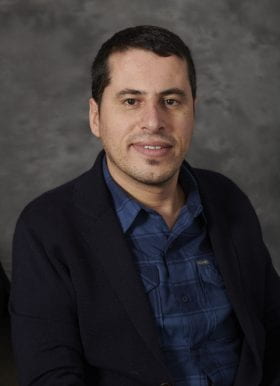
Mustafa Rfat
PhD Student in Social Work, Brown School
- Email: m.rfat@nospam.wustl.edu
Refugees/immigrants
Disability
Education
Economic Empowerment
Mental Health
This project aims to conduct a qualitative study investigating access to services among refugees with disabilities (RWDs) in the U.S., addressing the lack of awareness and visibility of this marginalized group. With over one million RWDs living in the U.S., systemic and structural barriers hinder their access to necessary services, compounded by discrimination and stigma.
Theories of Racial, Social, and economic justice- film study origin

Dalychia Saah
Assistant Professor of Practice, Brown School
Black liberation
Intrapersonal and interpersonal liberation
Sexuality and relationship education
Sexual pleasure, health, and liberation
Social Justice and Liberation
The project aimed to enhance students’ understanding of racial, social, and economic justice by organizing a screening of the film “Origin,” based on Isabel Wilkerson’s book “Caste: The Origins of our Discontents.” As part of the course “Theories of Racial, Social, and Economic Justice,” the film illustrates how oppression is systematically patterned across the globe to maintain social caste systems.
The Kigali After: a New City for the end of the world

Samuel Shearer
Assistant Professor, Arts & Sciences/African and African American Studies
- Email: sshearer@nospam.wustl.edu
Africa
Urbanization
Ethnicity and Migration
Street Economies
Capitalism
Infrastructure
This project sought partial funding to support the open-access publication of the forthcoming book “The Kigali After: a New City for the End of the World.” The book, an ethnography of sustainable urbanism and environmental justice in Kigali, Rwanda, blends perspectives from African urban studies, postcolonial ecocriticism, and Africanfuturism. Accepted by the University of California Press’s Atelier: Ethnographic Inquiry series, the manuscript is under contract for production in April 2024.
Asthma Home Occupation-Based Modified Environmental (HOME) ASSESSMENT: a pilot study
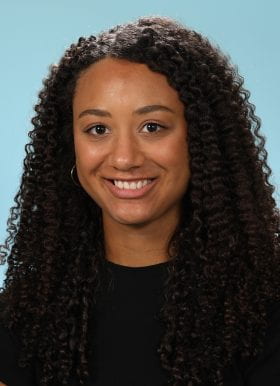
Lindsay Spell
Postdoctoral Research Associate, Program in Occupational Therapy
- Email: l.a.spell@nospam.wustl.edu
Asthma
Chronic Illness
Environmental Factors
Health Equity
Occupational Therapy
Participation
Pediatrics
The project aims to pilot the Asthma Home Occupation-Based Environmental Assessment (Asthma HOME) program to assess its feasibility, clinical effectiveness, and acceptability among families of youth with high-risk asthma, particularly African American youth. The program, which includes an evidence-based Medicaid-approved asthma home environment assessment and implementation strategies, targets asthma management through environmental interventions. The study’s central hypothesis is that Asthma HOME would be usable, acceptable, and effective in reducing healthcare utilization for youth with high-risk asthma.
Funding Undergraduate Research Assistants
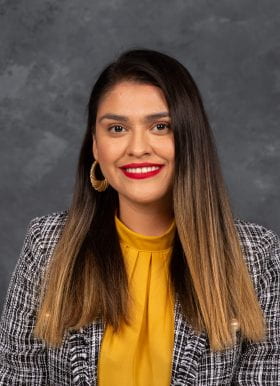
Nancy Jacquelyn Pérez-Flores
PhD Student, Social Work
- Email: pnancy@nospam.wustl.edu
Discrimination
Health and Mental Health Disparities
Immigration
Mental Health Literacy
Qualitative Methods
Race/ethnicity
Social Determinants of Health
Stigma
This dissertation project aims to investigate the relationship between mass media, mental health literacy, and public stigma within the Latinx population in nontraditional receiving communities. The third phase involves a content analysis of depression portrayal in Spanish-language news articles from Univision and Telemundo over six years. Funding will be used to facilitate this analysis through compensating two undergraduate research assistants fluent in Spanish, who will code and analyze the data.
The Hispanic Paradox in Child Maltreatment Reporting: Does it fade Generationally?

Yadira Tejeda
Graduate Student, Brown School of Social Work
- Email: t.yadi@nospam.wustl.edu
Latinx Families
Child Welfare System
Tejeda sought funding to present a paper titled “The Hispanic Paradox in Child Maltreatment Reporting: Does it fade generationally?” at the annual Society for Social Work and Research (SSWR) conference in Washington DC. The presentation explored the presence of the Hispanic Paradox in child maltreatment outcomes and its generational impact within the Hispanic population in the United States.
Perrception of Immigration Policy Instability

Ayse Selin Toprakkiran
Graduate Student, Arts & Sciences/ Psychological and Brain Sciences
Stereotypes
Social Identity
Intergroup Relations
Prejudice,
Implicit Attitudes
The project aims to investigate the impact of perceived instability in U.S. immigration policies on immigrants and their U.S.-born adult children. Initially, an experiment involving 900 U.S. immigrants examined the relationship between perceptions of immigration policy stability and sense of belonging in the U.S. The interdisciplinary team, comprising a sociologist and two psychologists, intends to publish a peer-reviewed manuscript synthesizing qualitative sociological research on punitive immigration policies’ consequences with social-psychological research on immigrant well-being. The project’s ultimate goal was to contribute empirical evidence to advocate for more consistent and humane immigration policies.
Assessing real-world access to trauma-informed mental health services for historically marginalized youth: A mystery shopper study

Dani Adams
NIMH T32 Postdoctoral Fellow, Brown School
- Email: a.danielle@nospam.wustl.edu
Access to Mental Health Services
Child and Adolescent Mental Health
Health Disparities
Implementation Science
Medicaid
Mixed Methods
Organizational Interventions
The awardee used the grant to support presenting their project, “Assessing Real-World Access to Trauma- Informed Mental Health Services for Historically Marginalized Youth: A Mystery Shopper Study” at the American Public Health Association Conference in Boston, Massachusetts in November of 2022. Dr. Adams presented the paper in the form of an oral presentation and used funds to cover the costs of travel (flight and hotel). At the conference, Dr. Adams was able to share the findings of the study that indicated that discrimination on the basis of race or ethnicity may be occurring at the point of scheduling in community mental health settings, as the Black and Latina voice actresses in the study who called these agencies to schedule services were 18% less likely to be granted an appointment than the White actress. Dr. Adams was able to share these findings and network with experts in the field of public health in a continued effort to develop solutions to reduce bias and discrimination in community mental health settings. Since the conference, this paper was submitted to a peer-reviewed journal for publication; it is currently in the review process.
Conditional Visibility: Strategies of Insertion of Afrocaribbean art and artifacts in Cuba, Puerto Rico and Dominican Republic’s Contemporary Museums

Karla Aguilar Velazquez
Hispanic Studies PhD Student, Romance Languages and Literatures & Museum Educator at the Kemper and the Pulitzer Museum, Curator at the Center of Creative Arts (COCA)
Afro-spirituality
Folklore
Hispanic Caribbean
Memory Studies
Museum Studies
National histories
Witchcraft
During the Spring semester and summer of 2023, the awardee used the grant to purchase 25 art catalogues in the Caribbean, from the 1970s to the present for her research project Conditional Visibility. By accessing materials that were not available through traditional research sources in the U.S. they was able to craft an innovative dissertation chapter. This innovation consisted in the use of a quantitative approach that challenges assumed ideas of the invisibility of race discussions in contemporary exhibitions in Cuba, Puerto Rico, and Dominican Republic. By changing the focus from exhibition frequency to exhibition language in the catalogues they argued that the museums participated in larger cultural policies that reduced Afro-Caribbean culture to folklore and an overcome past. Finally, they presented a conference proposal with these research conclusions to the conference Afro-Cuban Legacies: Visual Arts, Literature, Theatre, Music and Religion, hosted at the University of Missouri at 2024.
Social Justice in our Schools

SynClaire Arthur
Doctoral Student, Psychological & Brain Science
- Email: a.synclaire@nospam.wustl.edu
Adolescents
Black/African American
Education
Identity
Social Justice
Sociopolitical Development
Trauma
Funding was used to provide monetary compensation for participants in the pilot research study, “Social Justice in our Schools.” This study aims to explore what factors contribute to Black educational administrators’ beliefs about the use and importance of a social justice lens within their work. The project aims to accomplish three primary goals: 1. Identify how Black administrators’ social identities (e.g., race, gender, and social class) and their work-related experiences in education contribute to their leadership approach within their current position; 2. Explore Black administrators’ perceptions of how and why social justice matters within educational settings; and 3. Consider how Black administrators’ beliefs inform their implementation practices via academic and social programming initiatives within their schools. Despite challenges in recruitment, preliminary findings from completed interviews were able to be presented by the PI during a graduate student poster session at the first annual Innovation in Social and Community Psychology Summit on October 27, 2023.
High school mentorship program to further diversity, community, and leadership in the field of occupational therapy

Diana Castellanos
Doctoral Student, Occupational Therapy
Early exposure to healthcare careers
Educational inclusion
Diversity
Mentorship Developing
The research aimed to address the lack of diversity in the occupational therapy (OT) profession in the United States by developing a mentorship program targeting high school students. After identifying Gateway High School in St. Louis City as a suitable pilot site, researchers proceeded with program development based on a needs assessment. The mentorship program, led by experienced faculty member Dr. Catherine Hoyt, consisted of six bi-weekly in-person sessions, with recruitment efforts including lunch booths and gift card incentives. Anticipated outcomes included fostering mentorship relationships, increasing diversity in OT and healthcare professions, and establishing ongoing connections with the high school. Success was measured by the percentage of participants completing at least four meetings, with 75% participation targeted, and through pre-post satisfaction surveys. Additionally, funding was sought for travel to a professional conference in April 2023 to present findings and for continuing education in mentorship program development.
anthology of roma poetry

Rajnesh Chakrapani
PhD Student, Comparative Literature
Immigration and Migration
Social Justice
Translation
Gender
Speculative Archive
Diasporic Writing
Documentary Poetics
This grant enabled the awardee to travel to Romania to curate an anthology of contemporary poetry from Romanian and Roma poets. During the trip, the awardee interviewed and translated the works of Elvisey Pisica, a rapper, poet, and social activist. Pisica discusses the challenges he faces as a Trans Roma artist in his city, as well as the continued discrimination and stereotypes encountered by the Roma community due to limited exposure and communication between Roma and Romanian artists. The YouTube interview conducted with Pisica has garnered significant attention. Through this interview, centered on the translation of Pisica’s poetry, the awardee realized the transformative potential of translation in fostering discussions and promoting cultural understanding within a larger global audience and within the community being translated.
(re)constructing Latinx anthem through the 2020 superbowl halftime performance

This grant supported the awardee in attending the Second ALARI Conference on Afro-Latin American Studies, hosted by the Afro-Latin American Research Institute at Harvard University. The conference was held from December 7-9, 2022, in Cambridge, Massachusetts. She presented her paper titled “(Re) constructing the Latinx Anthem through the 2020 Super Bowl Halftime Performance.” The paper explores how Shakira and J. Lo’s 2020 Halftime performance, featuring reggae ton artists Bad Bunny and J Balvin at the Super Bowl, can be viewed as a Latinx anthem. However, it also examines what the (re)constructed anthem eulogizes in relation to race and ethnicity for the Latinx community in the US context. She argues that the anthem maintains ideologies of mestizaje from Latin America that exclude Black populations from being part of the “Latinx” community. Presenting at the ALARI conference was pivotal to her budding career and network as a race, gender, and Afro-Latin American scholar-in-training. She was able to connect with scholars, activists, and colleagues across the African diaspora.
Diverse Parent Perspectives on Genetic Testing for Neurodevelopmental Disorders

Jordan Cole
Former Neurogenetics Fellow, Neurology
- Email: jordan.cole@nospam.wustl.edu
Diversity, Equity, and Inclusion
Health disparities
Neurodevelopmental disorders
Neurogenetics
Social determinants of health
The awardees aimed to conduct qualitative interviews with parents of children with neurodevelopmental disorders, with a focus on patients at St. Louis Children’s Neurology outpatient clinic. This grant provided support for a research assistant to assist with data collection and analysis, resulting in the completion of 17 semi-structured qualitative interviews. Researchers successfully recruited nearly 50% of participants from Black/African American or Hispanic/Latino backgrounds, meeting its goal for diverse perspectives.
Critical Race and Ethnic Studies Approaches to Popular Dance in Research and Pedagogy

Joanna Das
Assistant Professor of Dance, Performing Arts Department
African Diaspora
Critical Race Theory
Dance
Popular Performance
Racial Capitalism
US History
Whiteness
The award covered the awardee’s travel cost to the “Critical Race and Ethnic Studies Approaches to Popular Dance in Research and Pedagogy” roundtable in Detroit, Michigan in the summer of 2022. Her roundtable contributed to ATHE’s efforts by offering examples of how to approach popular dance research and pedagogy from Critical Race Theory and Ethnic Studies frameworks. Her project, “Reclaiming Space for Black Dance in St. Louis,” discussed how Professor Denise Ward-Brown (Sam Fox) and Professor Das, as co-conveners of a Divided City Research Working Group, engaged in a collaborative research endeavor to interrogate the relationship between public policy and cultural erasure—how the demolition of St. Louis’ Black neighborhoods in the mid-twentieth century contributed to historical amnesia about those communities’ contributions to the development of jazz dance. The roundtable prompted substantive and generous discussion, including questions about how to balance thinking about individuals and thinking about communities, about how different media (live performance or film) affects racial representation, about historical memory, and other questions
A Zooarcheological Perspective of the Early and Late Atlantic Slave Trade’s Social and Economic Disruption in West Africa
This research project culminated in the completion of the awardee’s Master’s thesis for the Department of Anthropology. The project utilized a relatively recent advancement in zoo archaeological techniques called Zooarchaeology by Mass Spectrometry (ZooMS) to investigate animal consumption, cuisine, and elite identity in the Kingdom of Dahomey. Dahomey was a West African kingdom in modern-day Benin whose strong centralized monarchy was heavily involved with the Slave Trade. The investigation focused on the ways in which cuisine was used to project the Dahomean elite’s self-perceived cosmopolitan identities to both their subjects and foreign dignitaries by re-analyzing an archaeological faunal assemblage. Research involved accessing and sorting the assemblage at the University of California Santa Cruz and receiving training in ZooMS techniques at the University of Tennessee Knoxville. Ultimately, 109 samples were analyzed, making the awardee the first researcher at Washington University in St. Louis to utilize ZooMS. In the future, there is a hope to expand the analysis to cover non-elite cuisine and to connect that research to a larger discussion of how people in West Africa were impacted by the increased violence of the Slave Trade.
Performance Disparities Between Accents in Automatic Speech Recognition
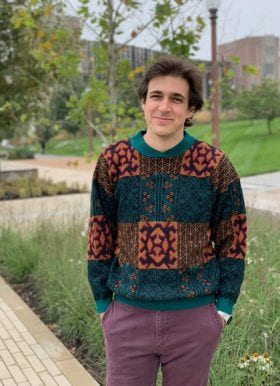
Alex DiChristofano
PhD Student, Division of Computational & Data Sciences
Algorithmic fairness and bias
Data science
Housing
Machine learning
Resource allocation
Funds from this grant enabled the dissemination and publication of “Performance Disparities Between Accents in Automatic Speech Recognition” at the 37th AAAI Conference on Artificial Intelligence in 2023. Funding from the grant covered registration and travel expenses to Washington, D.C., a necessary condition for publication. The paper was selected as a finalist for the Student Abstract presentation competition, and the awardee presented the work both at the competition and during the poster presentation session. The work was published as a student abstract in the Proceedings of the 37th AAAI Conference on Artificial Intelligence, while a longer preprint is available on arXiv under the title, “Global Performance Disparities between English-Language Accents in Automatic Speech Recognition”.
Medicaid Equity for Puerto Rico

Raul Gierbolini
PhD Student, Public Health Sciences, Brown School
- Email: g.raul@nospam.wustl.edu
Dissemination & Implementation Science
Health Equity
Latin America
Physical Activity

Eugen Resendiz Bontrud
Doctoral Student in Public Health Sciences, Brown School
- Email: eugen@nospam.wustl.edu
Built Environment
The research proposal sought funding to present a poster entitled “Descriptive Analysis of Poverty Measurement: The Case for Medicaid Equity in Puerto Rico” at the 2023 Annual Research Meeting. Through this presentation, the researchers aimed to delve into the intricate relationship between poverty measurement and Medicaid equity in Puerto Rico, offering insights crucial for policymakers and practitioners in healthcare. By employing descriptive analysis, the study intended to uncover the multifaceted factors contributing to the disparities in Medicaid access within Puerto Rico.
The Impact of an Educational Intervention on Anti-Black Interpersonal Bias Among Medical Students in an Academic Medical Center

Gmerice Hammond
Instructor of Medicine, Cardiology
- Email: ghammond@nospam.wust.edu
Health care policy implementation
Value based payments
Racial and socioeconomic based inequities in outcomes
Social determinants of health

Ilana Olin
MD/PhD Student, School of Medicine
- Email: i.olin@nospam.wustl.edu
Anti-racism
Bias mitigation
Educational interventions
Health disparities
Medical education
Social determinants of health

Joshua Tobin
Graduate Student, School of Medicine
Healthcare disparities
Anti-racism
Medical Education
Interpersonal racism
Implicit bias
Interpersonal racism and anti-Black bias among healthcare providers were identified as modifiable causes of glaring racial health inequities. In response, Washington University School of Medicine (WUSM) and other peer institutions developed and deployed educational interventions targeting medical students to mitigate the effects of such biases on patient outcomes. However, the evidence base for these interventions remained underdeveloped, with little long-term follow-up and short intervention durations. To address this gap, a study was initiated to examine the effectiveness of the Gateway Curriculum, recently implemented at WUSM, which includes a Health Equity and Justice Thread focused on anti-Black bias training. The study aimed to contribute to an evidence base for educational interventions addressing racial inequities by conducting a longitudinal study of students’ beliefs and attitudes regarding anti-Black bias at various stages of their medical education. Funding was used to incentivize robust student participation in pilot studies necessary to validate assessment tools and conduct initial data collection. This funding helped facilitate the refinement of assessment tools for the launch of longitudinal data collection with the WUSM entering class of 2023.
Development of a Theoretical Model to Move Towards Equity in Occupational Therapy

Catherine Hoyt
Instructor, Occupational Therapy
- Email: hoytcr@nospam.wustl.edu
Child development
Early intervention
Occupational therapy
Sickle cell disease
Previous models in occupational therapy focused on the characteristics of the individual, the environment, and the desired occupations (things that the person needs and wants to do). This project focused on developing a theoretical model for the field of occupational therapy that includes the clinical provider as a part of the solution to providing inclusive and supportive client- and family-centered care. The awardee used funds to hire graphic designer Lamar Woods from Wood & Tech LLC to support the development of a new model for conveying this new complex topic to their audience. This collaboration resulted in two papers that were reviewed by the American Journal of Occupational Therapy and Occupational Therapy in Health Care. The collaboration has also resulted in an accepted poster abstract that was presented at the American Occupational Therapy Association Annual Conference in April 2023 in Kansas City, MO.
Guanyu Xu and expanding Asian representation in Contemporary Photography

Meghan Kirkwood
Assistant Professor, Sam Fox School/Visual Arts
Natural resources
Landscape photography
South Africa
The project sought funding to facilitate the visit of artist Guanyu Xu to Washington University in February 2023. As a nationally-recognized Chinese photographer, Xu’s work delves into themes such as power dynamics in photography and the interplay between personal freedom and political contexts, particularly from the perspective of a Chinese gay man. Xu’s exhibition at the Weitman Gallery aimed to provide a platform for his unique perspective. Xu conducted a print workshop and critique session with students, offering invaluable insights into his artistic process and perspectives. Notably, this initiative marked the first time the gallery featured an Asian artist, despite the significant presence of Asian students in photography classes. The awardee collaborated closely with Xu, facilitating the workshop and critique, while also leveraging this opportunity to learn from Xu’s approach to teaching and engaging with students. This experience informed the Professor Kirkwood’s work with non-white photography students on campus.
measuring stereotypes via text

Messi Lee
PhD Student, Division of Computational and Data Sciences
- Email: hojunlee@nospam.wustl.edu
Language
Machine Learning
Quantitative Methods
Stereotyping and Prejudice
This project aimed to measure the associations of racial/ethnic groups with semantic attributes from open-ended text responses. The small grant facilitated data collection through Qualtrics and the Cloud Research platform, resulting in over 120 responses that provided valuable insights into recent experiences of racial prejudice, serving as the foundation for analysis. Findings indicated alignment with the positions proposed in the Racial Position Model (Zou & Cheryan, 2017), revealing that African and Hispanic Americans were more associated with inferiority compared to Asian and White Americans, while Asian and Hispanic Americans were more associated with foreignness compared to African and White Americans, although these effects were almost negligible. Consequently, modifications were made to the survey question to explicitly capture dimensions of superiority/inferiority and Americanness/foreignness, minimizing noise in measurements. The small grant was instrumental in facilitating data collection and analysis, contributing to the advancement of understanding in racial/ethnic associations with semantic attributes, with plans to present findings at the Annual Conference for the Society for Personality and Social Psychology.
Immigrants in St. Louis

Sharlene Lee
Graduate Student, Sam Fox School of Design and Visual Arts
- Email: sharlenelee@nospam.wustl.edu
Cultural identity
Feminist Theory
Immigration
Language
Projection Mapping
Video Art
The award was used to develop “Well-Spoken, 2023,” an immersive video installation at the Kemper Museum featuring interviews with immigrants in St. Louis, exploring perceptions of individuals who speak or appear different. The artist aimed to delve into the social and cultural impacts of the English language, both locally and globally. Participants reenacted personal experiences, such as job discrimination or unpleasant encounters due to language barriers. Viewers entering the installation encountered various languages spoken around them, challenging their understanding and reversing power dynamics. Feedback from viewers indicated a heightened awareness of language barriers and a desire for deeper understanding, promoting reflection on personal biases and encouraging openness and respect towards diverse communities.
Ugly White People
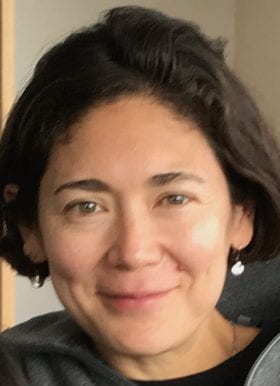
Stephanie Li
Former Lynne Cooper Harvey Distinguished Professor of English
American Literature
Blackness
Gender and Sexuality
Popular and Political Culture
Racial Representations
Whiteness
The goal of the Black Lives Matter Literature RWG was to create a space where faculty, students, staff and community members interested in exploring contemporary writing concerning Black Lives Matter could meet to discuss and develop a vocabulary for talking about the literature of BLM. Specifically, their goal was to foster discussion about Black Lives Matter as a concept that unites literary, political, and historical debate across works and genres. These discussions helped to reshape the works that members had in progress.
The Relationship Between State Violence, Trust in Government, and Vaccine Uptake

Caitlin McMurtry
Assistant Professor, Brown School
- Email: mcmurtry@nospam.wustl.edu
Firearm Deregulation
Health Disparities
Health Politics
Racial/Ethnic Discrimination
Policing
The project delves into the structural roots of vaccine hesitancy among Black Americans, examining how aggressive policing practices and state violence impact trust in government and vaccine acceptance. Initially intending to analyze the relationship between police stops, government trust, and vaccination rates using California Department of Justice data, the researchers encountered data access hurdles. Consequently, they redirected their efforts towards conducting focus groups with Black adults in Milwaukee, Wisconsin, utilizing the grant for this purpose. The focus groups aimed to unravel perceptions of police, government, and vaccines, factors shaping trust, and their interplay within communities. With meticulous planning, including website development, recruitment strategies, and participant incentives, the researchers conducted four focus groups in St. Louis and planned additional groups in Wisconsin. Facing recruitment challenges in Minnesota, they shifted the secondary site to Milwaukee, where access to detailed policing and vaccine data facilitated research. Seeking grant reallocation for travel expenses, they emphasized the necessity of racial concordance between interviewers and respondents for meaningful discussions. Future plans involve utilizing insights from focus groups to develop a survey instrument for a poll in Milwaukee in 2025, with funding sought from the Robert Wood Johnson Foundation. Through these endeavors, the project aims to deepen understanding and address vaccine hesitancy among Black communities, contributing to public health initiatives and policy interventions.
The Plantation Imagination: Studies in Salt, Oil, and Sugar

Robin McDowell
Former Assistant Professor of African and African American Studies
Black Ecology
Black Geographies
Design Methods
Environmental Racism
Louisiana
Racial capitalism
History of U.S. Slavery
The award funded travel to New Orleans for the awardee to lead a public Earth Pigments workshop in conjunction with INHABITATION, an exhibition at the Albert and Tina Small Center for Design at Tulane University on December 21, 2022. Fourteen participants from across the Greater New Orleans area included local activists, artists, students, educators, and government workers. After a short lecture on histories of environmental racism in Southeast Louisiana locations and a hands-on demonstration, participants worked together in a beautiful outdoor patio space to create watercolors with soil samples taken from locations explored in the lecture. They also used the pigments to create experimental paintings. While working, participants shared stories of their own experiences and knowledge of environmental issues in Louisiana and reected on the process of pigment-making in a community (as opposed to alone in a studio) as a form of environmental justice. The awardee shared a series of photographs taken by the Albert and Tina Small Center for Design of the lecture, workshop, and the participant’s experimental paintings. The images and reections were also incorporated into the lecture: “Plant, Prison, Port, and Pigment” presented at the University of Illinois Urbana-Champaign, Washington University in St. Louis Living Earth Collaborative Seminar Series, and Seoul National University American Studies Institute.
Constructing the Racial “Other”: Race and Ethnicity in Latin America

Mabel Morana
- Email: moranamabel@nospam.gmail.com
Critical Race and Cultural Studies in Latin American cultures
Migration and Borders
Race and the Nation
Race in Modernity
The research project aimed to produce a comprehensive book titled “Constructing the Racial Other: Race and Ethnicity in Latin America,” comprising 18 chapters analyzing historical and cultural developments related to racial conflicts and integration across Latin America from the Discovery era to the present. The book, accepted for publication by Vanderbilt University Press and Herder Eds., covers all regions of Latin America, providing an interdisciplinary and comparative examination of colonial and postcolonial societies. The small grant was sought to facilitate professional revision and editing of the chapters prior to publication. The outcomes of this project will contribute to the existing literature by offering a unique and in-depth exploration of sociological, economic, and political issues concerning diverse ethnicities in Latin America, including Africans, Afro-descendants, Indigenous peoples, Creoles, Asians, Syrians, Lebanese, Jews, and others.
AI-Transcription of Manuscript Court Records for “The Color of Bankruptcy”
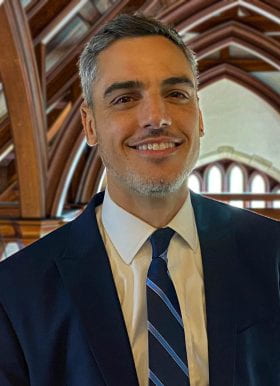
Rafael Pardo
Walter D. Coles Professor of Law, School of Law
- Email: pardo@nospam.wustl.edu
Bankruptcy
Commercial Law
Contracts
Courts and Judges
Legal History
Race and the Law
Slavery
This grant supported Dr. Pardo’s book project, “The Color of Bankruptcy: Financial Failure and Freedom in the Age of American Slavery,” which was published as part of Columbia University Press’s Columbia Studies in the History of U.S. Capitalism series. The book examines how federal bankruptcy law supported American slavery’s capitalism while simultaneously facilitating claims to civic inclusion by free Black Americans. The awardee relied on manuscript court records produced under the Bankruptcy Act of 1841 in the Eastern District of Louisiana to tell this story. Funds were used to purchase credits on the AI platform used to transcribe the manuscript court records produced under the Bankruptcy Act of 1841.
The Ugly Caribbean: Caribbean Writers and the Rejection of Paradise

Crystal Payne
Graduate Student, English and American Literature
- Email: c.payne@nospam.wustl.edu
Black diaspora
Border Theory
Caribbean Studies
Exile
Hemispheric American Studies
Migration and movement
Postcolonial theory
The project involves an in-depth historical analysis of colonialism and the representation of the Caribbean as both paradise and purgatory, examining how Caribbean writers challenge exploitative portrayals of their home. The awardee sought funding to advance this study at the British Library, accessing archives on migration, ethnicity, and post-colonialism, among others. By examining the narratives of Caribbean people and spaces, the research aimed to highlight the impact of colonialism and racism on global perceptions of the region. The awardee was able to spend spent considerable time at the British Library in London during a summer trip in 2023, immersing themselves in colonial West Indian newspaper archives and rare texts. This research informed the development of the fourth chapter of their dissertation, which will be expanded into an article, revealing nuanced dimensions of Caribbean identity beyond traditional paradigms of paradise and ugliness. Additionally, by exploring books on return migration, the researcher uncovered insights into conflicting narratives about home, culminating in the concept of the “Poetics of Home,” which became the title of their dissertation.
The State of Pediatric Neurosurgery Disparities Research
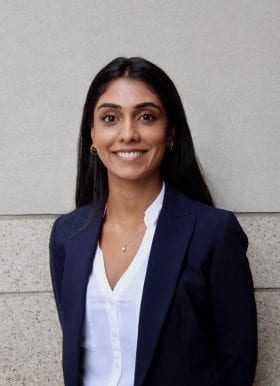
Sangami Pugazenthi
MD, School of Medicine
Health disparities
Social determinants of health
Medical Specialty Decision Making
Perceptions of Neurosurgery
The awardee used the grant to support presenting their project, “Assessing Real-World Access to Trauma- Informed Mental Health Services for Historically Marginalized Youth: A Mystery Shopper Study” at the American Public Health Association Conference in Boston, Massachusetts in November of 2022. Dr. Adams presented the paper in the form of an oral presentation and used funds to cover the costs of travel (flight and hotel). At the conference, Dr. Adams was able to share the findings of the study that indicated that discrimination on the basis of race or ethnicity may be occurring at the point of scheduling in community mental health settings, as the Black and Latina voice actresses in the study who called these agencies to schedule services were 18% less likely to be granted an appointment than the White actress. Dr. Adams was able to share these findings and network with experts in the field of public health in a continued effort to develop solutions to reduce bias and discrimination in community mental health settings. Since the conference, this paper was submitted to a peer-reviewed journal for publication; it is currently in the review process.
“Negra, criolla, horra, morena y ladina”: Black Women’s Agency as Legal Witnesses in Seventeenth-Century Lima
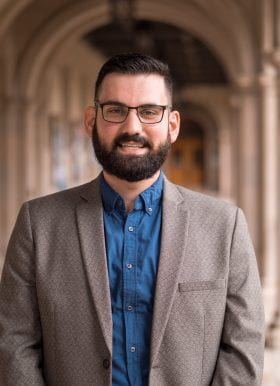
Juan Manuel Ramírez Velázquez
Former PhD Candidate, Romance Languages and Literatures
Colonial Latin America
Critical Race Theory
Displacement
Ethnicity
Gender
Migration
Mobility
This award supported travel to the Kentucky Foreign Languages and Literatures Conference in Lexington, Kentucky, in April 2023. The awardee presented their project titled “‘Negra, criolla, horra, morena, y ladina’: Black Women’s Agency as Legal Witnesses in Seventeenth-Century Lima.” This paper examines the testimonies of Black women servants in early seventeenth-century Lima, focusing on their pivotal role in a divorce lawsuit filed by a Spanish woman against her Genoese husband, arguing that these Black women demonstrate agency and socio-economic savvy amidst discriminatory treatment, challenging traditional narratives of servitude and subjugation. The awardee participated panels with scholars in their field. Presenting their project at this conference also provided the opportunity to receive insightful comments and feedback other panelists studying colonial Latin America.
Disrupting Perceptions of Colorblindness as the Norm: Children’s Talk About Race

Grace Reid
Former PhD Candidate, Psychological & Brain Sciences; Chancellor’s Fellow
- Email: reid.g@nospam.wustl.edu
Developmental Psychology
Intersectionality
Race
Social Cognition
This grant supported the dissertation project titled, “Disrupting Perceptions of Colorblindness as the Norm: Children’s Talk About Race.” The award helped compensate approximately 50 8- to 12-year-old children for their participation in the dissertation project. The award also provided financial support for travel to the 2023 Society for Research in Child Development Biennial Conference, where this work was presented as a poster. A portion of the dissertation project was also presented as a talk at the Boston University Developmental Science Emerging Scholars Symposium on Culture, Ethnicity, and Structural Racism: Influences on Child Development. Finally, an oral defense of this project was given to fulfill the dissertation requirements. A dissertation paper was also written that includes two manuscripts that are in preparation for submission at peer reviewed journals.
How Civic Education Mitigates and Exacerbates Outgroup Discrimination

Jeremy Siow
Graduate Student, Political Science
- Email: wsiow@nospam.wustl.edu
Comparative Politics
Political Socialization
Southeast Asia Politics
Ethnic and Race Politics
Education Policy
Quantitative Methods
This project sought to understand whether exposure to civic education affects social and political attitudes towards ethnic and national outgroups, such as immigrants and refugees. The awardee recruited Rakuten Insight and conducted a survey in Singapore in the month of November 2022. Overall, they found that respondents who received civic education displayed less ethnic outgroup prejudice but supported greater restrictions against immigrant entry. This result highlights the paradoxical effects of civic education, where the emphasis on nation building and identity mitigates intergroup prejudice between citizens of different ethnicities; yet, it exacerbates discrimination against immigrants who do not belong to the nation. His end goal is to complete the first draft of the paper and present the findings at the Midwest Political Science Association (MPSA) that will be held in April 2024.
Gendering Energopoetics: Violence and Symbiotic Bodies
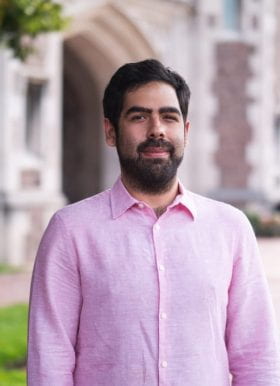
Francisco Tijerina
Graduate Student, Romance Languages and Literatures/Hispanic Studies
- Email: francisco@nospam.wustl.edu
Contemporary
Energy
Extractivism
Latin America
Literature
Minerals
Oil
The awardee attended two prominent conferences in their field and presented papers amidst esteemed colleagues. At the Modern Language Association (MLA) conference, a paper titled “Moth Women and Other Forms of Devouring the Canon in Veronica Gerber Bicecci’s Work” was presented. This paper explores the presence and importance of the
figure of moth women that Gerber Bicecci introduces over her intervention of Semonides de Amorgo’s Types of Women published in the anthology Tsunami (2018). The overarching argument is that through this minimal figure, Gerber Bicecci explores not only in importance of non-human beings as core members of our ecosystems but also the role that Latin American women (and other minoritized groups)are taking as they respond to a male dominated canon of literature.
“Petromasculine Capitalism: Men in Hurricane Season by Fernanda Melchor” was presented at the Latin American Studies Association (LASA) conference. This paper’s goal was to show how capitalism, through the enactment of extractivism, prioritizes the patriarchal pact that has been terrorizing contemporary Mexico to uphold both entangled systems altogether. These presentations facilitated discussions on the awardee’s research and fostered connections with scholars working on similar topics.
sarita sundar: Archival research & cross-cultural design dialogues

Aggie Toppins
Associate Professor & Chair, Sam Fox School/College of Art/Design
- Email: a.r.toppins@nospam.wustl.edu
Design
Social History
Critical Historiography
Representation
Semiotics
Intersectional Feminism
Racial Capitalism
This grant supported bringing Sarita Sundar, founder of Hanno, to campus. She delivered two lectures on her research, provided feedback to students on their work, and collaborated on published research. Her research and creative practice focus on the history of Indian design and visual culture in the 20th century. She investigates intercultural design dialogues between India and the United States, colonial and post-colonial representations of India, as well as Indian cultural practices in response to European modernism.
Intersections: A Workshop on Black and Indigenous Sound in the Early Atlantic World
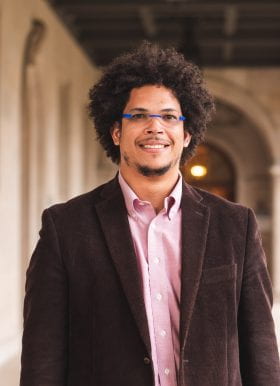
Miguel A Valerio
Assistant Professor of Spanish
- Email: m.a.valerio@nospam.wustl.edu
Africans and Afro-descendants in colonial Latin America literature and culture
Africans and Afro-descendants in the Mediterranean
Africans and Afro-descendants in Renaissance and Baroque literature and culture
Black confraternities in the Iberian Empires
Renaissance and Baroque festival culture
Funeral rituals among black confraternities
Afro-Latin American literature and culture
The history of race and racism
Identity formation
The awardee attended the “Intersections: A Workshop on Black and Indigenous Sound in the Early Atlantic World” workshop at the Commonwealth University of Virginia. This grant allowed him to travel to Richmond to workshop his research on early modern Black sound with an interdisciplinary group of scholars. He particularly benefitted from the feedback music scholars provided. This workshop also constituted the first meeting of his working group, which was expanded for a symposium at the Clark Library in Los Angeles in the spring of 2023. Going forward, the group intends to meet two more times, to workshop and finalize papers based on the research they workshopped in Richmond, respectively.
Activism as a Life Direction: Understanding How Purpose Motivates Activists

Megan Wilson
Graduate Student, Psychological & Brain Sciences
- Email: meganwilson@nospam.wustl.edu
Activism
Discrimination
Health disparities
Intergenerational discrimination
Purpose in life
This project centered on understanding when, whether, and why forgivingness may influence activism among Black adults. CRE2 funding has provided critical insights into the nature of forgivingness and activism; namely, it does not appear that being a disposition ally forgiving person in one’s social life carries consequences with respect to activist engagement. Put differently, being a forgiving adult does not lead individuals to avoid activism for social change, when they are confronted with everyday discrimination, and in fact may actually strengthen that association. These intriguing findings provide multiple next steps for research into forgivingness and activism. Hill and Wilson were able to conduct a second study to examine whether similar findings hold in scenarios were participants are asked to imagine a discriminatory experience occurring. They were also able to draft a manuscript based on their findings, present their work at a summit they co-hosted on the Psychology of Social Change here at Washington University, and discuss these counterintuitive findings with experts from across the nation.
Filipino American Identity beyond Southern California
This research compared identity attachments of children of Filipino immigrants across the U.S relative to prevailing pan ethnic categories and the factors that influence their identity formation. To capture Filipino identity attachments across different settings Bidwell interviewed 40 adult children of Filipino immigrants throughout the U.S. Gaining a fuller understanding of racial/ethnic identity formation is critical for forecasting other outcomes like voting behavior and romantic partner choice, which exert influence beyond the boundaries of any one group. This grant allowed the awards to utilize professional transcription for a significant portion of interviews during AY 2021-22 for her project.
The Object Selving of Laura Aguilar: Queer Chicana Opacity and the Archive Prosthetic

Jay Buchanan
Graduate Student, Art History and Archaeology
Critical poetics
Feminist and queer theory
Network aesthetics
Modern and contemporary art
Political history (US and Latin America since 1850)
Queer-of-color critique
The Small Grant was awarded in support of an article published on the photographer, Laura Aguilar through the MUSE. Image rights totaled $330. This was Jay Buchanan’s first solo article.
The Object Selving of Laura Aguilar: Queer Chicana Opacity and the Archive Prosthetic (jhu.edu)
Antiracism in Research Lecture Series
The Antiracism in Research Lecture Series, hosted by the WUSTL Brown School and the Black Families, Racism, and Resilience (BFRR) Lab, aimed to equip Brown School doctoral students with anti-racist research and practice methods through talks by scholars dedicated to racial and social justice across various disciplines. By focusing on health equity and confronting systemic racism, the series addressed contemporary societal challenges such as decolonizing research methods, empowering communities, and fostering social change strategies. This initiative provided invaluable insights to Ph.D. students, fostering diversity, inclusion, and equity efforts aligned with the school’s mission.
Whereas Hoops: Scholarship, Art, and Activism for Basketball in Forest Park
“Whereas Hoops,” this interdisciplinary seminar engaged the physical fabric of the city and utilize a variety of research methodologies to examine the history of sports and race in St. Louis, illuminate the realities of access and inequity in the sporting landscape of the city, and imagine more just and equitable futures.
2021-2022 Research Conference Support
Funds were utilized for two virtual conferences: Interdisciplinary Association for Population Health Sciences (IAPHS) and Society for Public Health Education (SOPHE). The funds covered registration fees for both conferences and the registration fees for three Research Assistants to attend SOPHE. As attendees, they had the opportunity to listen to a mix of presenters from varying backgrounds and areas of focus, participate in networking events, and learn new strategies to address the determinants of health and improve health outcomes from plenary and symposia sessions.
Thesis Research: Qualitative Study on the Racial Dynamics of Bioengineering

Rene Canady
Former PhD Student, Sociology
- Email: c.janet@nospam.wustl.edu
Black Health Resistance
Bioethics
Biomedical racism
Healthcare
Liberation theory
Social inequality
The grant supported thesis research activities during the Spring 2022 semester. The research comprised two parts: interviews with 30 engineers and ethnographies of four laboratories across different research universities. The study aimed to explore bioengineers’ perceptions of race and its implications for health equity, an area that had received limited attention despite its importance in shaping innovations in the medical field. By investigating how engineers understood race and its impact on their projects, the research intended to contribute to sociological literature on health disparities and racism, while also providing engineers with feedback to improve racial health equity through resulting publications and presentations.
Intersections: A Workshop on Black and Indigenous Sound in the Early Atlantic World

Lauren Eldridge Stewart
Assistant Professor of Music
Art Economies, Diaspora, Genre, Pedagogy, Sampling, Transnationalism

Esther Viola Kurtz
Assistant Professor of Music
- Email: ekurtz@nospam.wustl.edu
African Diasporic Music and Dance
Afro-Latin America
Capoeira Angola
Decolonization
Ethnomusicology
Racial Politics
Radical Humanism
This Small Grant supported Dr. Kurtz’s travel to “Intersections: A Workshop on Black and Indigenous Sound in the Early Atlantic World,” held in Norfolk, Virginia, October 13-16, 2022. The workshop focused on Black and Indigenous sound, music, and auditory culture in the early Atlantic world, bringing together leading scholars in this burgeoning field to share research in progress. The aim was to explore and discuss resonances among subaltern sound-ways in Europe, Africa, and the Americas. As an invited discussant, she read and responded to the work shared during the workshop sessions and provided valuable trans historical perspectives on Black sound by incorporating insights from her ethnographic research on capoeira Angola, an Afro-Brazilian practice that intersects with the workshop’s themes. She actively engaged in discussions, offering constructive feedback, and fostering connections across disciplines, language traditions, and geographies. Additionally, she commented on (dis)continuities among sound practices across time and shared her expertise on potential methodological interventions, enhancing the workshop’s interdisciplinary nature. Overall, her participation in the workshop facilitated collective, interdisciplinary thinking and contributed to the advancement of the field of early Atlantic sound studies. Workshop participants all recognized the unique nature of this generative opportunity to collaborate across disciplinary boundaries and forge new connections as peers.
Genealogies of Ethnic and Jewish Studies in the Academy

Maxwell Greenberg
Friedman Postdoctoral Fellow in Jewish Studies, Jewish, Islamic and Middle Eastern Studies
“Genealogies of Ethnic and Jewish Studies in the Academy,” was presented at an academic conference (May 2022) and prepare for publication subsequently. In response to on-going legal debates concerning funding of Ethnic and Jewish Studies programs across the United States, his research seeks to historicize the disciplines divergent trajectories of incorporation into public-ed institutions from the 1960s-present.
Research Assistance for “Fetishizing Trial” and “Race on Appeal” Articles
The applicant aimed to use funding to support in two review articles targeted at achieiving more racially just outcomes in the criminal legal system. The review articles fell within the Center’s core theme for the 2021 academic year: Legal, Spatial, and Political Justice, particularly targeting racially just outcomes in the criminal legal system. The first article, titled “Fetishizing Trial,” aimed to challenge prevailing notions about plea bargaining and propose alternative solutions to address racial disparities within the criminal legal system. The second article, titled “Race on Appeal,” aimed to explore how race is litigated (or not) in Supreme Court criminal jurisprudence and advocate for more race-conscious lawyering and judging.
Forgiveness as a Promoter or Antagonist to Social Activism in Black Adults

Patrick Hill
Associate Professor of Psychological and Brain Sciences
discrimination; health; identity development; marginalization; purpose in life; well-being

Megan Wilson
Graduate Student, Psychological & Brain Sciences
- Email: meganwilson@nospam.wustl.edu
Activism
Discrimination
Health disparities
Intergenerational discrimination
Purpose in life
This project centered on understanding when, whether, and why forgivingness may influence activism among Black adults. CRE2 funding has provided critical insights into the nature of forgivingness and activism; namely, it does not appear that being a disposition ally forgiving person in one’s social life carries consequences with respect to activist engagement. Put differently, being a forgiving adult does not lead individuals to avoid activism for social change, when they are confronted with everyday discrimination, and in fact may actually strengthen that association. These intriguing findings provide multiple next steps for research into forgivingness and activism. Hill and Wilson were able to conduct a second study to examine whether similar findings hold in scenarios were participants are asked to imagine a discriminatory experience occurring. They were also able to draft a manuscript based on their findings, present their work at a summit they co-hosted on the Psychology of Social Change here at Washington University, and discuss these counterintuitive findings with experts from across the nation.
Intersectional Denunciations of Sexual Assault and the Police in Michaela Coel’s I May Destroy You and Édouard Louis’ Histoire de la violence
The Small Grant allowed the awardee to travel a to participate in the 39th Annual 20th and 21st Century French and Francophone Studies International Colloquium, which was held at the University of Pittsburgh from March 24 to March 26 2022. He presented his project titled, “Intersectional Denunciations of Sexual Assault and Police in Michaela Coel’s “I May Destroy You and Édouard Louis’ Histoire de la violence” in a panel on francophone media studies. Attending this colloquium allowed him to share his work, listen to feedback by fellow scholars, and get to know colleagues across the country and their work.
Study of the Reverend James M. Lawson, Jr. Papers
Professor McGinley used this Small Grant to travel to Vanderbilt University to examine the Reverend James Lawson archives in October 2021. These archival materials yielded a wealth of insight into Reverend Lawson’s work and thought. They formed the core research material of her chapter “‘Acting As If You Were Free to Act:’ the Nashville Workshops, Spirit Technique, and Training for Direct Action” for her manuscript-in-progress People Get Ready. She was able to finish this chapter in February 2022.
The Greek Nation at Home and Abroad: How Domestic Attitudes toward Immigrants Shape Greek Foreign Policy
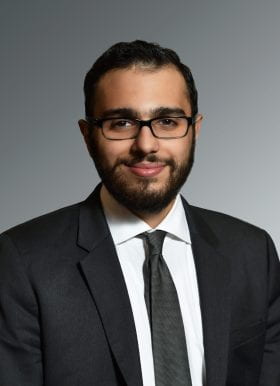
William Nomikos
Former Assistant Professor, Political Science
- Email: wnomikos@nospam.wustl.edu
African Politics
Civil War
Experimental Methods
Ethnic Conflict
International Relations
Legacies of Colonialism
Peacekeeping
The project aimed to investigate how domestic attitudes toward immigrants in Greece shaped Greek foreign policy. It began by highlighting the story of Giannis Antentokounmpo, whose journey underscored the challenges faced by immigrants in Greece, with discrimination being prevalent. The paper aimed to explore the link between domestic attitudes toward immigrants and official foreign policy, an area that had been underexplored in the study of Greek politics. By combining historical evidence, ethnographic fieldwork in Greece, and a survey of 2,000 Greeks, the research aimed to elucidate the relevance of identity formation on foreign policy in contemporary Greece. The grant also covered lodging for the applicant to attend the Annual Meeting of the Council for European Studies in Lisbon, Portugal, in June-July 2022, to present their paper and receive critical feedback.
Historical Intervention, Racialization, and Attitudes about Asylum Seekers
This project explores the recurring involvement of the United States in the political and economic affairs of other nations, often resulting in significant population displacement, as individuals from these nations frequently seek entry into the U.S. The research seeks to analyze the influence of exposure to information regarding U.S. intervention in a specific nation on attitudes towards U.S. responsibilities towards its citizens, examining potential variations based on ethnoracial identity. Notably, existing scholarship has not investigated the impact of historical U.S. foreign intervention information on contemporary attitudes towards immigration to the U.S. This study contributes to understanding U.S. racial dynamics and the role of historical information in shaping attitudes towards modern immigration policy
Latinx Reproductive Control: Racialized Biopolitics and Intersectional Resistance
The awardee was able to attend and present at the annual conference of Sociologists for Women in Society (SWS) in Albuquerque, New Mexico, in March of 2022. The presentation was fruitful for eliciting feedback from a range of scholars with a deep knowledge of reproductive justice and Latino’s experiences of medical violence. This conference gave her arrange of helpful feedback and places to improve her project’s argument and paper. They planned to submit for publication at the interdisciplinary journal Signs.
Language of Instruction & Ethnic Prejudice in Malaysia

Jeremy Siow
Graduate Student, Political Science
Comparative Politics
Political Socialization
Southeast Asia Politics
Ethnic and Race Politics
Education Policy
Quantitative Methods
This project sought to understand whether exposure to civic education affects social and political attitudes towards ethnic and national outgroups, such as immigrants and refugees. The awardee recruited Rakuten Insight and conducted a survey in Singapore in the month of November 2022. Overall, they found that respondents who received civic education displayed less ethnic outgroup prejudice but supported greater restrictions against immigrant entry. This result highlights the paradoxical effects of civic education, where the emphasis on nation building and identity mitigates intergroup prejudice between citizens of different ethnicities; yet, it exacerbates discrimination against immigrants who do not belong to the nation. His end goal is to complete the first draft of the paper and present the findings at the Midwest Political Science Association (MPSA) that will be held in April 2024.
Contesting Queer Geographies: Violence and Refuge in Buenos Aires, Argentina
“Contesting Queer Geographies: Violence and Refuge in Buenos, Argentina” was an ethnography of how the violence of Argentina’s racialized pro-LGBT investments affected gay men’s refuge, made up of their physical, mental, and sexual health. This project utilized methods including participant observation, interviews, and archival analysis. The research considered how the queer spaces in Buenos Aires are simultaneously (1) sites of struggle between gay men and the state and (2) refugees shaped by violence.
Afro-Brazilian Mothers’ Caregiving for Children with Congenital Zika Syndrome in Bahia, Brazil

Eliza Williamson
Former Lecturer, Latin American Studies
Care
Childbirth
Disability
Feminist Theory
Health Disparities
Health Policy
Reproduction
With the funding received from the CRE2 Small Grant, Lecturer Eliza Williamson was able to conduct all follow-up interviews and focus groups with Afro-descendant families raising children with congenital Zika syndrome in Bahia, Brazil. The interviews provided significant insights that can be used to advocate for better policy to address the needs of families raising children with congenital Zika syndrome in Brazil and elsewhere, and they will be a key part of Williamson’s writing and advocacy work going forward. Using her Dedoose subscription, they were also able to transcribe and do preliminary content analysis of these interviews. She was able to draw major themes from this data and used it to finish a chapter of her book manuscript. The data was also used in a co-authored article with two Brazilian colleagues on caregiving during COVID in Brazil as well as a chapter in an edited volume.
Study of the Relationship of Neighborhood Crime during Pregnancy to Structural and Functional Brain Development in Neonates at Birth in a Majority Black Population
High crime neighborhoods are theorized to arise due to concentrated poverty, a lack of legitimate economic opportunities, low collective efficacy, hopelessness, and lead exposure – which were all created by historical redlining and perpetuated by continued racial segregation. The awardees used the neighborhood crime data to determine participant’s exposure to neighborhood crime (i.e., whether participants lived in a high crime neighborhood) in a prospective, longitudinal study of over 300 mother-infant dyads that were majority Black. The results showed that higher levels of neighborhood crime exposure were related to weaker connectivity between the thalamus and anterior default mode networks. These findings were published in Biological Psychiatry (Brady et al., 2022). The second analysis examined whether living in a high crime neighborhood was also associated with greater mental health problems at 1 and 2 years of age. The results showed that living in a high crime area was associated with more externalizing symptoms, specifically aggressive and defiant behaviors, at ages 1 and 2 years.
Gaps in Medical Training for Eating Disorders: A Nationwide Survey
The research aimed to investigate the factors driving disparities in treatment-seeking for eating disorders (EDs) concerning race, sexual orientation, and gender identity. It hypothesized that insufficient postgraduate medical training and broader social inequities in care contributed significantly. Utilizing a brief online survey, researchers engaged a nationally representative sample of post-graduate medical trainees to identify and characterize existing gaps in medical education and training in ED care, including sensitivity to marginalized groups. The survey collected demographic data and assessed knowledge, skills, attitudes, and behaviors related to inclusive treatment of ED patients. Anticipated results included insights into current gaps in ED medical training, with data analysis expected to yield a scientific publication submitted to an academic journal. Through this research, researchers sought to inform strategies for addressing healthcare disparities in ED treatment.
The Material World of Modern Segregation: St. Louis in the Long Era of Ferguson
Mindfulness and Anti-Racism Series
This project sought to explore how mindfulness can aid anti-racism efforts. The awardees’ immediate aim is to use the award to raise awareness of the connection between mindfulness and racial justice. Awardees planned a lecture and panel discussion featuring Rhonda Magee, JD, a renowned expert in integrating mindfulness with social justice. The bulk of the grant was used to fund honorarium for Magee, with the rest covering marketing materials. This initiative aligns with the goal of promoting health equity by making mindfulness accessible to marginalized communities. This project went on to receive funding through CRE2‘s Research Working Group program.
Crime and Racial Capital
Crime and Racial Capital argues an alternative racial history of American criminal administration; it was responsive to Michelle Alexander’s The New Jim Crow and various critiques of Alexander’s groundbreaking thesis. As a comparative historical account of the transformation of criminal federalism in the U.S., Crime and Racial Capital seeks to explain crime policy consensus within the federalist system by way of a sociological pattern, one that repeats throughout American history. This grant provided support for a research assistant from the WASHU Department of History to initiate the development of the book’s historical narrative.
Indigenous and Black Confraternities in Colonial Latin America: Negotiating Status through Religious Practices
This Small Grant was used to subvert the production Dr. Valerio’s co-edited volume, Indigenous and Black Confraternities in Colonial Latin America: Negotiating Status through Religious Practices. The edited volume studies, under a trans regional and interdisciplinary approach, indigenous and black confraternities –or lay Catholic brotherhoods– founded in colonial Spanish America and Brazil between the sixteenth and eighteenth centuries. It presents a varied group of cases of religious confraternities founded by subaltern subjects, both in rural and urban spaces of colonial Latin America, to understand the dynamics and relations between the peripheral and central areas of colonial society, underlying the ways in which colonialized subjects navigated the colonial domain with forms of social organization and cultural and religious practices. The book analyzes indigenous and black con fraternal cultural practices as forms of negotiation and resistance shaped by local devotional identities that also transgressed imperial religious and racial hierarchies. The analysis of these practices explores the intersections between ethnic identity and ritual devotion as well as how the establishment of black and indigenous religious con fraternities carried a subversive potential to colonial discourse.






